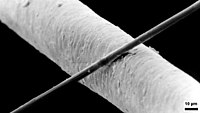
Photo from wikipedia
In situ grafting of a reactive matrix and nanofillers is a promising strategy to fabricate graft-type polypropylene (PP)-based nanocomposites, where the grafting efficiency is affected by the initial dispersion of… Click to show full abstract
In situ grafting of a reactive matrix and nanofillers is a promising strategy to fabricate graft-type polypropylene (PP)-based nanocomposites, where the grafting efficiency is affected by the initial dispersion of nanofillers in the matrix. In this work, influences of surface organic modification of nanofillers were investigated on properties of PP/SiO2 nanocomposites using poly(propylene-co-octenyltrimethoxysilane) as a reactive matrix. The surface modification of SiO2, especially with longer alkyl chains, led to improved dispersion of nanoparticles, thus promoting the grafting reaction and mechanical properties. The combination of in situ grafting and surface modification of nanofillers provided several benefits, most notably in balancing the strength and the toughness, which could not be achieved by the grafting alone.
Journal Title: Polymers
Year Published: 2022
Link to full text (if available)
Share on Social Media: Sign Up to like & get
recommendations!